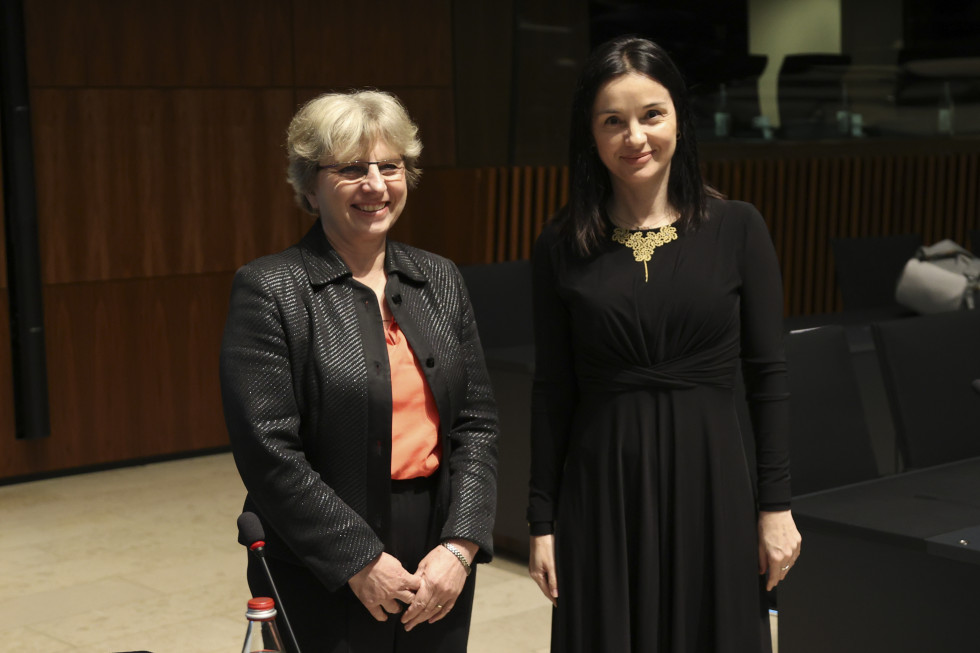EU agriculture ministers express solidarity with ukraine and stress their committment to finding a common solution

Minister Irena Šinko and croatian agricultural minister Marija Vučković | Author Svet Evropske unije
In the first part of the Council, the European Commission presented the proposal for a regulation establishing a Union certification framework for carbon removals. Minister Irena Šinko endorsed the proposal and stressed the importance of reducing emissions to achieve climate neutrality, in particular in light of targets in agriculture and forestry. "We should take into account the primary role and the parallel benefits of agriculture and forestry sectors and the specificities of member states. Agriculture and forestry sectors have limited potential and the possibility of ensuring carbon sinks at the EU level will be increasingly affected by the impacts of climate change. In relation to the specific situation in Slovenia, we would like to highlight the small size of our farms and a great land fragmentation."
In the afternoon, ministers discussed the situation on agricultural markets in light of the war in Ukraine. The Ukrainian Minister of Agriculture Mykola Solskyi spoke to EU ministers via videoconference. The European Commission reported on the situation on agricultural markets and the support to member states bordering Ukraine. Poland, Slovakia, Lithuania and Latvia presented the situation brought about by the increased import of agricultural products and the crisis in the dairy sector. Member states discussed the impact of imports of agricultural products from Ukraine on EU markets. They stressed the importance of finding a common solution, while expressing solidarity with Ukraine. During the discussion, Minister Irena Šinko noted that the problem should be solved at the EU level and that Slovenia has also detected the impact of an increased import of Ukrainian flour and poultry meat. "The situation has a negative impact also on member states that do not directly border Ukraine as we are all part of the single market." She recalled the issues faced by Slovenian companies from the milling industry and poultry breeders. "Similar to the situation in the countries bordering Ukraine, Slovenia also witnesses an inflow of flour sold at much lower prices, which causes market fluctuation." According to Minister Šinko, Slovenia supports a common EU approach. "We support comprehensive and systemic solutions at the EU level and we have reservations about unilateral solutions. It is up to the European Commission to decide to buy these stocks of wheat and other market surpluses intended for third countries." Minister Šinko added that the situation on agricultural markets should be monitored in a comprehensive manner since it affects further investment by producers and the purchasing power of consumers.
Ministers then discussed the implementation of strategic plans of the common agricultural policy. Minister Šinko noted: "With regard to IACS interventions, Slovenia has finished preparing national decrees and has established management systems, including controls. In late March, we started a campaign for submitting single applications for 2023 and we are at the final stage of preparing for other interventions." In relation to Slovenia's experience in introducing strategic plans, Minister Šinko said that the preparation of national legislation and the implementing elements in the Paying Agency require certain time and that green architecture should be paid particular attention, in particular the necessary balance between the economic viability and greater environment protection. She highlighted detailed information and communication with farmers and added that "farmers in Slovenia protest today to express their unhappiness with the requirements of the interventions and market fluctuations caused by the import of products from Ukraine. Farmers expect their views on the necessary flexibility, food security and market situation to be heard." On how to improve strategic plans, Minister Šinko highlighted the necessary adjustments as a result of crises and flexibility in their implementation. "We should ensure greater flexibility in transferring the obligations from the rural development programme into the strategic plan, in particular in investment measures, taking into account new conditionality requirements. We expect more flexibility from the Commission in solving the issue of transitioning from one programming period to another and in implementing new interventions, such as ecoschemes."
At the initiative of Slovenia, the EU Council discussed the Commission's report on the EU-coordinated action "From the hives" and its relevance for the revision of the Honey Directive. Considering the great importance of beekeepers and beekeeping in Slovenia, Slovenia advocated solutions to help the sector and, at the same time, provide consumers with transparent and clear information to make informed choices when buying honey. Minister Šinko expressed Slovenia's expectations about the revision of the Honey Directive, in particular the changes in labelling honey blends that the Minister highlighted already in January's Council. The European Commission published this long-awaited proposal on Friday. "The first impressions are mixed," said the Minister, while welcoming the proposal for indicating the third countries of origin. "However, we regret that the Commission's proposal does not include the proportion of honey from particular countries." Minister Šinko stated that the recent report on the EU-wide coordinated action “From the Hives” concludes that nearly half of honey imported from non-EU countries is suspected of not complying with the legal provisions. "This confirms the correlation between the origin of honey and its quality. A greater labelling transparency and informed consumer choices would contribute to preventing honey adulteration in the long-term." According to the Minister, this transparency would improve the position of European beekeepers who aim to place real and quality honey on the market and restore consumers' confidence. "We therefore call on the Commission to take into account the findings of the report when negotiating on the revision of the Honey Directive and to come up with solutions to detect honey adulteration, such as adulteration with syrups." Slovenia's initiative was supported by a large number of member states.

